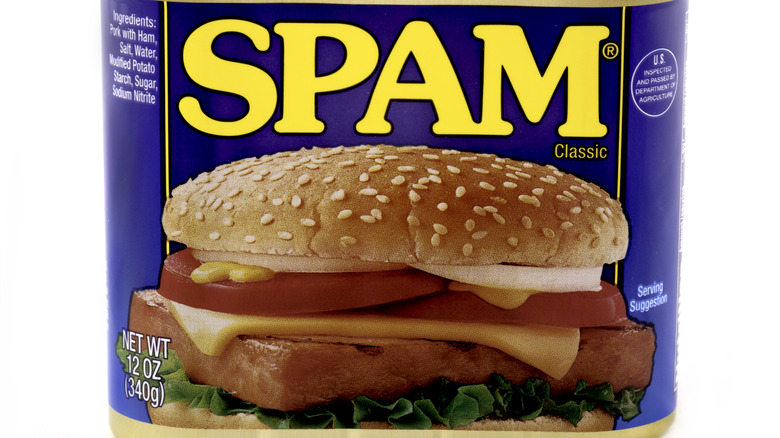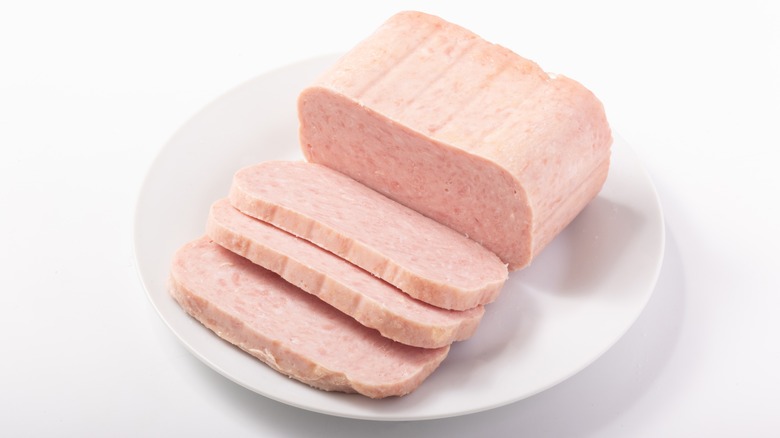What Really Happens If You Eat Too Much Spam?
Spam has been a shelf-stable fave for meat eaters ever since it was invented in 1937 by Jay Hormel. Since then, it's become a staple of store cupboards across the country — and indeed around the globe.
It's no surprise that Spam is particularly beloved in places with a history of Army occupation and food scarcity. "Having the sort of food that can survive in the tropical heat and be kept on a shelf for weeks and months was a huge boon," food historian Rachel Laudan tells Eater. The canned pork product became a mainstay of Hawaiian cuisine following local sanctions on deep sea fishing that left locals with few options for protein sources, and it has since been incorporated into the local cuisine in dishes like spam musubi or loco moco. Spam became beloved in both the Philippines and Guam post-World War II; today, residents of Guam consume an average of 16 cans of Spam per person per year.
But while Spam is certainly a delicious, inexpensive source of protein, with a whopping seven grams per two-ounce serving, it's not something that should necessarily be consumed with reckless abandon. Spam as an occasional food is fine for most, but if you eat it daily, these are some of the symptoms you might expect to experience.
You might gain weight
Spam is relatively high in fat, with 15 grams per two-ounce serving. And while the days when folks believed that eating fat made you gain weight are long over, that doesn't mean you're in the clear if you eat too much Spam. The only surefire way to gain weight is to increase one's calorie intake, and just 300 to 500 calories more than your target is enough to contribute to weight gain. Spam is relatively calorie-dense, with 174 calories per two-ounce serving, as compared to 117 calories for the same amount of farmed salmon or just 94 calories for the same amount of chicken breast.
Spam can definitely be consumed as part of a healthy diet, but seeing as it's significantly higher in both fat and calories than many other protein sources, if you consume too much of it too often, it's likely you'll see your weight increase as a result.
Your blood pressure may spike
Spam is a type of processed meat, a category that also includes things like cured sausages, hams, and hot dogs. Processed meats like these have been linked to a higher risk of some health issues, including high blood pressure, something studies seem to indicate may be linked to their high sodium content. Eating too much sodium appears to make it more difficult for our kidneys to get rid of unnecessary fluid, which contributes to higher blood pressure. Meanwhile, the reduction of salt intake has been shown to reduce blood pressure among high blood pressure individuals.
Processed foods often contain more sodium than most, with the American Heart Association noting that not only do 90% of Americans consume too much of the mineral, but more than 70% of the sodium consumed by Americans comes from processed foods. And Spam is no exception. Just one serving of Spam contains 790mg of sodium — a third of the RDA. It's no surprise that consuming too much Spam, then, could contribute to a spike in blood pressure.
You may get bloated
The high salt content of Spam can also contribute to other health issues like bloating or water retention. Bloating, after all, is one of the most common short-term side effects of eating too much salt. Luckily, there's an easy, albeit counter-intuitive, solution to this problem: Drink more water.
While it would be understandable to assume that if you're retaining water, you just need to drink a bit less of it, the reality is that the opposite is true. Sodium causes the body to hold onto water, but drinking more water can help flush out any excess sodium, thus reducing water retention and bloat. According to the U.S. National Academies of Sciences, Engineering, and Medicine, men need about 3.7 liters of fluids a day, and women need about 2.7 liters. If you're consuming loads of salty foods like Spam, however, you may find you need a bit more than that to keep bloating in check.
You may become very thirsty
Given the sodium content of Spam, it's perhaps no surprise that eating too much of it can make you quite thirsty. Eating salty foods often leads to thirst due to the way in which sodium is absorbed into the bloodstream. As the blood absorbs excess sodium, its fluid balance is thrown off. As a result, the blood goes looking for fluid to balance out the sodium, which it finds in your cells. Robbed of their essential fluid, the cells send a thirst signal to your brain to help balance things out. As a result, the more salty food like Spam you eat, the thirstier you're likely to become.
Regular dehydration and thirst can lead to far more than just discomfort and more trips to the bathroom. It's not uncommon to confuse thirst with hunger, which can lead to overeating and, thus, inadvertently to weight gain. Frequent thirst due to an overconsumption of Spam can also distract you from underlying issues of which thirst may be a symptom, things like diabetes, hyperthyroidism, or even schizophrenia.
You may have trouble sleeping
Another side effect of consuming foods that are high in salt is diminished sleep quality. Research shows that consuming too much sodium doesn't just make it harder to fall asleep; it also deteriorates the quality of your sleep and reduces the likelihood you'll enter into long stretches of restorative deep sleep. Studies have also shown a potential link between overconsumption of sodium and sleep disorders like sleep apnea, a sleep disorder where sufferers experience stopped breathing while asleep. Sleep apnea diminishes the restorative quality of sleep, which can lead to excessive sleepiness, irritability, high blood pressure, metabolic diseases, and even liver disease.
If you're going to consume salty foods like Spam, not only is it better to do so infrequently, but it's better to enjoy them earlier in the day, with Spam scramble or breakfast sandwich, for example, to better give your body time to process the sodium by the time you nod off.
You may suffer headaches
If you've started suffering more headaches since increasing your Spam consumption, don't be surprised: One common side effect of consuming too much sodium is indeed an increased frequency of headaches, with research showing that those who consume less sodium are 31% less likely to suffer headaches than those who do not decrease their sodium consumption. One study even showed that those who consume a low-sodium DASH (Dietary Approaches to Stop Hypertension) diet could see their odds of severe migraines reduced by up to 46%.
While the reasons for the relationship between sodium intake and headaches are not fully understood yet, some experts posit that the increased likelihood of headaches in those consuming a high-sodium diet is linked to the increased likelihood of high blood pressure, of which one symptom is indeed head pain. Excess consumption of salt may also cause the blood vessels in your brain to expand, which can also lead to headaches.
You may be at higher risk for kidney disease
Some of the side effects of the sodium in Spam are mere annoyances, but others are quite a bit more serious. One potential downside of eating too much of this tasty lunch meat? An increased risk of kidney disease.
Since sodium is processed by the kidneys, overconsumption of sodium-rich foods like Spam, especially long-term, can lead to kidney stones or even kidney disease. While this holds especially true for those with high blood pressure, some research indicates that even those who do not suffer high blood pressure may suffer kidney damage as a result of overconsumption of sodium. Reducing salt intake and protein intake are two of the six suggestions proposed by the National Kidney Foundation for those with kidney disease, so if you have or are at risk for kidney disease, keeping Spam consumption in check is a great idea.
You may be at higher risk for heart disease and diabetes
Another acute side effect of consuming too much Spam is the increased risk of developing both diabetes and coronary heart disease. Studies have shown that eating processed meat is linked to a higher risk of both conditions, with the likelihood of developing type 2 diabetes increasing by a whopping 50% in those who consumed more red meat. This, experts posit, may be due to a number of potential factors, including the possibility that the heme iron in red meat could damage pancreatic cells. Others theorize that red meat may increase insulin resistance and general inflammation, which is a risk factor for metabolic syndrome.
But while the consumption of any red meat seems to contribute to the increased risk of these health issues, processed meat may prove even more dangerous. The nitrates and nitrites in processed or cured meat like Spam are risk factors for both health issues, as when these foods are heated, the compounds are converted to nitrosamines. Exposure to nitrosamines is a proven risk factor for insulin resistance diseases like type 2 diabetes and seems to increase the risk of developing cardiovascular disease, too.
You may be at higher risk for cancer
It may seem like everything causes cancer these days, but when it comes to processed meats like Spam, you'll want to be extra careful. The nitrosamines that may contribute to an increased risk of diabetes and heart disease have also been found to increase the risk factor for certain cancers.
One review of 61 different studies linked the consumption of nitrosamines to a higher risk of stomach cancer, and seeing as overconsumption of salty foods is also linked with the development of this type of cancer, the risk factors are only compounded with the increased consumption of salty, processed Spam.
And stomach cancer isn't the only kind you need to worry about. Still, other studies have linked consumption of nitrites and nitrates to a higher risk of brain cancer and thyroid cancer, and chronic general inflammation seems to lead to cancer as well. This is all the more reason to balance your occasional consumption of Spam with foods rich in cancer-fighting antioxidants like berries, leafy greens, or citrus.









